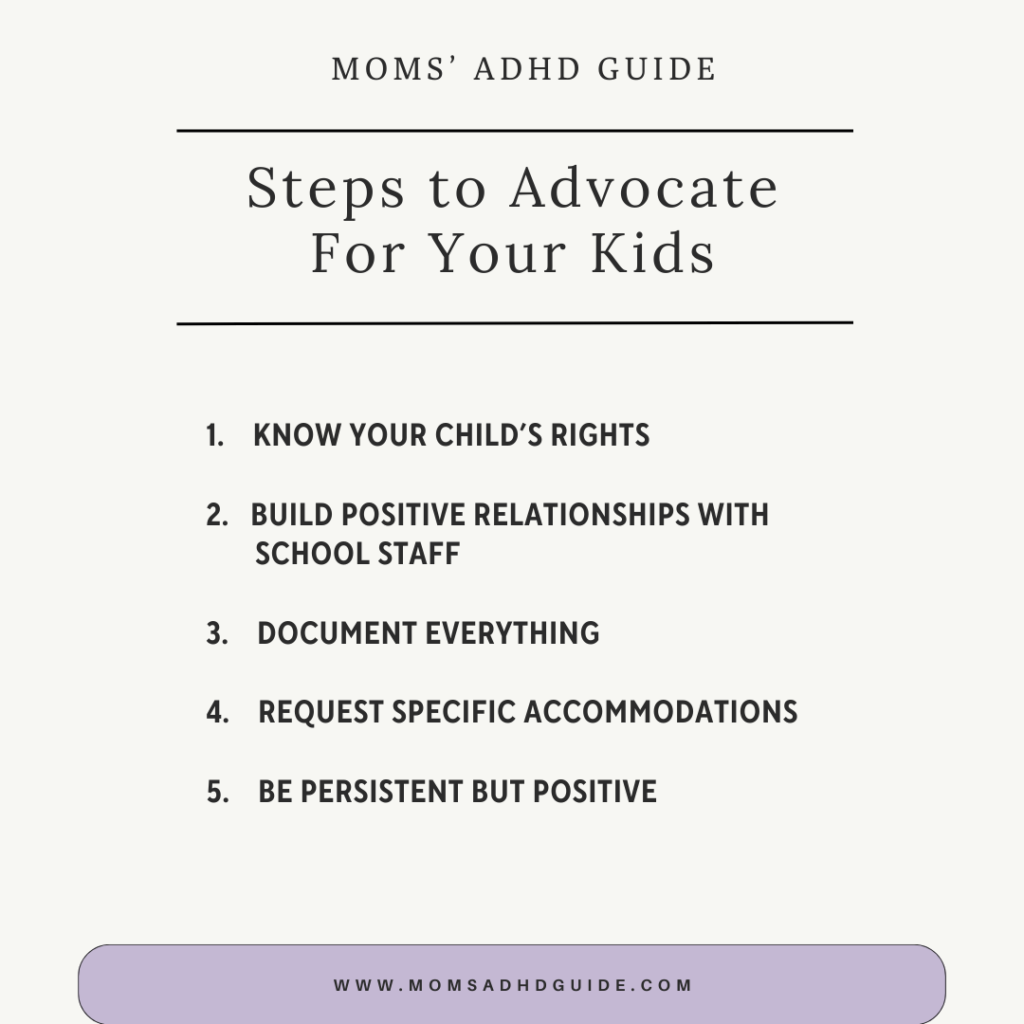Steps to Advocate for your Kids
As moms, we always want what’s best for our kids, and when your child has ADHD, advocating for them at school can be difficult. The school environment is often challenging for kids with ADHD. They might struggle to focus, keep up with assignments, or follow directions, and they may face misunderstandings or unfair expectations. The goal is to make sure that your kids get what they need to thrive.
In this post, I’ll walk you through some key strategies to effectively advocate for your child at school, build strong relationships with teachers and administrators, and ensure your child gets the accommodations they deserve.

Steps to Advocate for Your Kids by Moms’ ADHD Guide
1. Know Your Child’s Rights
The first step in advocating for your child is understanding the rights they have in the school system. Children with ADHD are protected under federal laws like the Individuals with Disabilities Education Act (IDEA) and Section 504 of the Rehabilitation Act. These laws ensure that kids with disabilities, including ADHD, have access to the support and accommodations they need to succeed in school.
- Individualized Education Plan (IEP): If your child’s ADHD significantly impacts their ability to learn, they may qualify for an IEP. This is a customized plan that outlines specific goals, services, and accommodations tailored to your child’s needs.
- 504 Plan: If your child doesn’t qualify for an IEP but still needs some support, they might be eligible for a 504 Plan. This plan ensures they receive accommodations like extra time on tests, seating near the front of the classroom, or breaks during tasks.
It’s important to research and understand these options so that you can confidently discuss them with your child’s school and request what they need.
2. Build Positive Relationships with School Staff
One of the most important aspects of advocating for your child is developing strong, positive relationships with teachers and school staff. A collaborative approach helps ensure that everyone is working together to support your child.
- Schedule a Meeting Early in the School Year: Set up an introductory meeting with your child’s teacher, school counselor, or special education coordinator. Use this time to share information about your child’s ADHD, their strengths, and the challenges they face in the classroom.
- Share Insights: Be open and honest about how ADHD affects your child, and explain what strategies have worked well for them at home. The more the school understands about your child, the better they’ll be able to support them.
- Establish a Partnership: Let the teacher know that you’re committed to working together as a team. Ask how you can help support your child’s learning from home and be open to their suggestions as well.
3. Document Everything
When advocating for your child, it’s essential to keep thorough records. Documenting communications and decisions helps ensure that everyone stays on the same page and that there’s a clear record of what has been discussed and agreed upon.
- Keep a Communication Log: Track all meetings, emails, and phone calls with the school. This can help you stay organized and provide documentation if any issues arise later.
- Maintain Copies of Important Documents: Keep copies of all assessments, medical diagnoses, and reports related to your child’s ADHD. These documents will be important when discussing accommodations or services.
- Follow Up in Writing: After any significant conversation or meeting, send a follow-up email summarizing the discussion. This ensures that everyone has a written record of the agreements made.
4. Request Specific Accommodations
When advocating for your child, it’s important to be clear and specific about the accommodations they need to succeed. Vague requests, like “help with focus,” can be harder for teachers to act on. Instead, provide detailed suggestions based on your child’s needs.
Here’s a sample list of accommodations that can be requested to help kids in the classroom:
- Extra time on tests and assignments
- Breaks during lessons or long tasks
- A designated quiet space for taking tests or working on assignments
- Preferential seating near the front of the classroom
- Visual schedules or written instructions to help with organization
- Access to fidget tools or other sensory aids
- Daily check-ins with the teacher or school counselor to stay on track
And, most importantly….
5. Be Persistent but Positive
Advocating for your child can sometimes be frustrating, but persistence is key. You may need to have multiple conversations with the school to get the necessary support, but staying calm and focused will help you move forward.
- Stay Focused on Solutions: It’s easy to feel frustrated when things don’t go smoothly, but try to stay solution-oriented. Focus on what your child needs and how the school can help meet those needs.
- Be Assertive, But Respectful: It’s okay to be firm in advocating for your child’s rights, but maintaining a respectful tone will help build a cooperative relationship with the school staff.
- Follow Up Regularly: Keep the lines of communication open by checking in regularly with your child’s teacher or counselor. This allows you to monitor progress and address any new concerns that arise.
Advocating for your child at school can be daunting, but you are their best advocate. It’s also important to teach your child to advocate for themselves as they grow during this process. Understanding their rights and building strong relationships at school can help them get the support they need to help them succeed. Remember to stay focused on their needs and speak up if you don’t feel they are being met. Together, you and the school can create a supportive environment where your kids can thrive.








